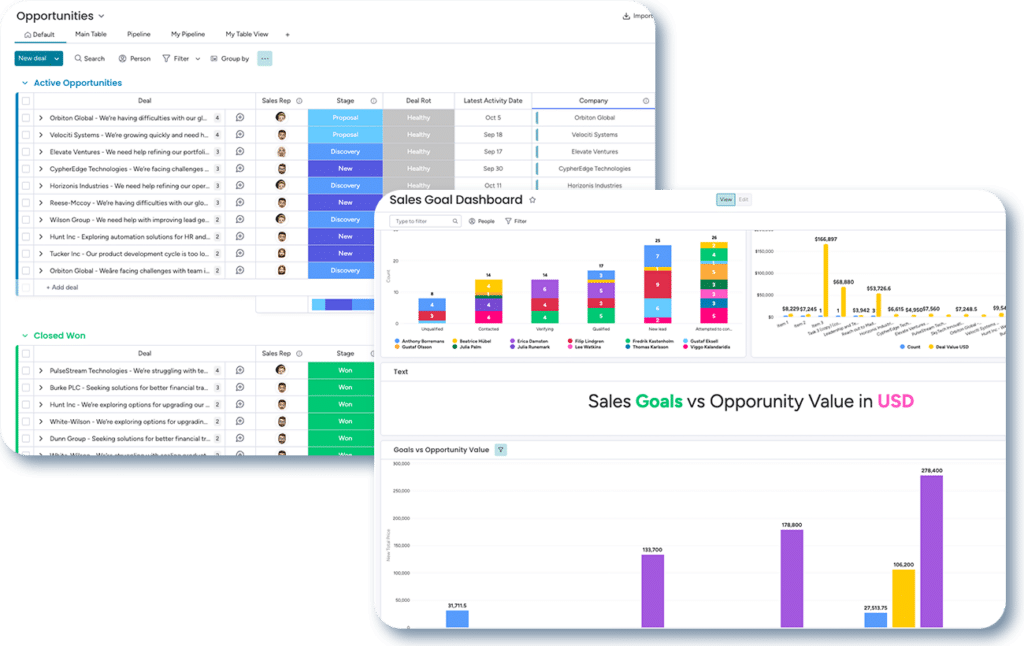Introduction to AI and ML in CRM
In the realm of customer relationship management (CRM), the incorporation of artificial intelligence (AI) and machine learning (ML) has been nothing short of revolutionary. As we delve into the world of incorporating AI and machine learning in CRM strategies, it’s crucial to understand the transformative impact these technologies have on CRM systems.
AI and ML: Redefining CRM’s Capabilities
At its core, CRM is about understanding and managing customer interactions to improve business relationships. With the advent of AI and ML, this understanding has taken a quantum leap. Incorporating AI and machine learning in CRM strategies allows businesses to process vast amounts of customer data, gleaning insights that were previously unattainable. This includes predicting customer behaviour, personalizing marketing efforts, and enhancing customer service, thereby reshaping the landscape of CRM.
The Evolution from Data Management to Intelligent Insights
Traditional CRM systems focus primarily on managing customer data and interactions. However, incorporating AI and machine learning in CRM strategies signifies a shift towards proactive and predictive management. AI algorithms can analyze customer data patterns, predict future behaviours, and suggest optimal strategies for customer engagement. This evolution transforms CRM from a reactive tool into a proactive, intelligent system.
A Synergy of Human and Machine Intelligence
Incorporating AI and machine learning in CRM strategies doesn’t replace the human element. Instead, it enhances it. AI and ML provide sales and customer service teams with powerful tools to understand and predict customer needs, but the human touch remains crucial in interpreting and acting on these insights. The goal of incorporating AI and machine learning in CRM strategies is to create a synergy where machines handle data analysis, leaving humans to focus on creative and empathetic aspects of customer relationships.
The Foundation for Future Innovations
As we continue to explore AI and machine learning, it’s evident that this is just the beginning. These technologies lay the groundwork for more advanced applications, such as voice recognition, chatbots, and more sophisticated predictive analytics, which will further revolutionize CRM.
In conclusion, incorporating AI and machine learning in CRM strategies marks a significant milestone in the evolution of customer relationship management. By harnessing the power of AI and ML, businesses can unlock new levels of efficiency, personalization, and customer insight, paving the way for more meaningful and productive customer interactions.
The Impact of AI and ML on CRM Systems
One of the most significant impacts of incorporating AI and machine learning in CRM strategies is the ability to transform raw customer data into actionable insights. AI and ML algorithms excel at sifting through large data sets, identifying patterns, and extracting valuable information. This means businesses can now understand customer preferences, buying habits, and feedback in real-time, enabling more informed decision-making and personalized customer engagement strategies.
Predictive Analytics: Anticipating Customer Needs
A cornerstone of AI and machine learning in CRM strategies is predictive analytics. This technology goes beyond analyzing past customer behaviour; it predicts future actions, enabling businesses to proactively meet customer needs. For instance, predictive analytics can forecast which products a customer is likely to purchase next, allowing for targeted marketing campaigns and inventory planning.
Automated Customer Engagement
Automating customer engagement is another critical aspect of incorporating AI and machine learning in CRM strategies. AI-driven chatbots, email automation, and personalized content recommendations enhance customer interactions without requiring constant human oversight. These tools ensure customers receive timely, relevant, and personalized communication, increasing engagement and satisfaction.
Enhanced Personalization at Scale
Personalization is key in today’s market, and incorporating AI and machine learning in CRM strategies allows businesses to personalize customer experiences at scale. AI algorithms can analyze individual customer preferences and behaviours, tailoring marketing messages, product recommendations, and support services to each customer’s unique needs. This level of personalization, difficult to achieve manually, significantly improves customer experiences and loyalty.
Streamlining Sales and Customer Service Processes
Incorporating AI and machine learning in CRM strategies streamlines sales and customer service processes. AI can qualify leads, recommend next steps to sales representatives, and even predict sales outcomes, optimizing the sales funnel. In customer service, AI-driven tools can route inquiries to the appropriate department, provide instant responses to common queries, and assist human agents with complex issues, thereby enhancing overall efficiency and customer satisfaction.
Ethical Considerations and Privacy
As businesses continue incorporating AI and machine learning in CRM strategies, ethical considerations and customer privacy become increasingly important. Responsible use of AI involves ensuring transparency, fairness, and respect for customer privacy. Businesses must navigate these challenges carefully to maintain customer trust and comply with regulations.
In summary, the impact of incorporating AI and machine learning in CRM strategies is profound and multifaceted. From transforming customer data into actionable insights to enhancing personalization and automating customer engagement, AI and ML are redefining the way businesses interact with their customers. As these technologies continue to evolve, their role in CRM will only become more integral, offering unprecedented opportunities for businesses to grow and thrive in a competitive marketplace.
Omnitas Newsletter
Sign up for our monthly newsletter to stay up-to-date on our latest blog articles, videos and events!
Thank you!
You have successfully joined our subscriber list.
Real-World Applications of AI and ML in CRM
The real-world impact of incorporating AI and machine learning in CRM strategies becomes evident through various industry-specific use cases. For example, in the retail sector, AI-driven CRM systems have been used to personalise shopping experiences, leading to increased sales and customer loyalty. In finance, AI and ML aid in fraud detection and provide personalized financial advice, enhancing customer trust and satisfaction. Healthcare organisations use AI to manage patient interactions and improve care delivery, demonstrating the versatility of AI and ML in enhancing CRM across diverse fields.
AI and ML Integration with Existing CRM Platforms
A key aspect of successfully incorporating AI and machine learning in CRM strategies is their integration with existing CRM platforms. Many CRM providers now offer AI capabilities as part of their services, or they allow integration with third-party AI solutions. This seamless integration ensures that businesses can leverage AI and ML without the need to overhaul their existing CRM systems. The result is a more intelligent, responsive, and efficient CRM process that builds on existing infrastructure. A powerful CRM platform that offers both its own AI tool as well as quick and easy integration with third-party AI solutions is monday.com. The platform is extremely customisable and integration-friendly so you as a user can easily mould it according to your needs.
Personalized Customer Journeys with AI and ML
Incorporating AI and machine learning in CRM strategies allows companies to create highly personalized customer journeys. By analyzing customer interactions and behaviours, AI can map out individualized customer paths, recommending specific actions at each stage of the customer lifecycle. This approach leads to more effective marketing campaigns, improved customer retention, and ultimately, a more cohesive and satisfying customer experience.
Enhancing Customer Service with AI Chatbots and Assistants
AI chatbots and virtual assistants have become invaluable in CRM, offering immediate, 24/7 support to customers. By incorporating AI and machine learning in CRM strategies, businesses can provide quick answers to common questions, freeing human agents to handle more complex queries. These AI assistants are continually learning from interactions, becoming more effective over time and providing a scalable solution to customer service needs.
Predictive Maintenance in Product-based Industries
For product-based industries, incorporating AI and machine learning in CRM strategies extends to predictive maintenance. AI algorithms analyze product usage data to predict when maintenance or replacement is needed, proactively addressing issues before they escalate. This not only improves customer satisfaction by reducing downtime but also helps businesses manage resources more effectively.
Ethical AI and Privacy Considerations in Practice
As businesses adopt these technologies, ethical AI practices and privacy considerations remain paramount. Companies must ensure that their use of AI in CRM complies with data protection regulations and respects customer privacy. Transparency in how AI algorithms make decisions and use customer data is crucial to maintaining trust and ethical standards.
In conclusion, the real-world applications of incorporating AI and machine learning in CRM strategies are vast and varied, offering significant benefits across industries. From enhancing customer service to predictive analytics and personalized customer journeys, AI and ML are reshaping the way businesses interact with and understand their customers. As these technologies continue to advance, their role in CRM will expand, offering even more innovative ways to engage and satisfy customers.
Overcoming Challenges and Maximizing Benefits
While incorporating AI and machine learning in CRM strategies offers immense benefits, it’s not without its challenges. One of the primary hurdles is data quality and quantity. AI and ML algorithms require large, clean datasets to function optimally. Businesses must ensure their data collection and management processes are robust enough to support AI-driven insights. Another challenge is integration complexity, particularly when blending AI with legacy CRM systems. This requires thoughtful planning and, often, expert assistance to ensure seamless integration and operation.
Strategies for Successful AI and ML Integration in CRM
To maximize the benefits of incorporating AI and machine learning in CRM strategies, businesses should adopt a strategic approach. This includes starting with clear objectives for AI and ML use, such as improving customer satisfaction, increasing sales, or enhancing predictive analytics capabilities. Equally important is choosing the right AI and ML tools that align with these objectives and integrate well with existing CRM systems. Ongoing training and support for staff who will use these tools are crucial for successful adoption and use.
Building a Data-Driven Culture
A key factor in successfully incorporating AI and machine learning in CRM strategies is fostering a data-driven culture within the organization. Employees at all levels should understand the value of data and how AI and ML can enhance customer relationships and business outcomes. Encouraging a culture of data literacy and continuous learning can help businesses make the most of their AI and ML investments.
Ensuring Ethical Use and Customer Trust
As AI and ML become more ingrained in CRM, ensuring their ethical use is paramount. This includes being transparent about AI-driven decisions, respecting customer privacy, and adhering to regulatory requirements. Building customer trust is essential, as customers are more likely to engage with businesses that use their data responsibly and ethically.
Leveraging AI and ML for Continuous Improvement
Incorporating AI and machine learning in CRM strategies is not a one-time effort but an ongoing process. Businesses should continuously monitor and evaluate the performance of their AI and ML tools, making adjustments as needed. This iterative approach allows for continuous improvement, ensuring that AI and ML applications remain effective and aligned with changing business and customer needs.
In summary, overcoming the challenges and maximizing the benefits of incorporating AI and machine learning in CRM strategies requires a strategic, thoughtful approach. By addressing implementation challenges, fostering a data-driven culture, ensuring ethical use, and committing to continuous improvement, businesses can fully leverage AI and ML to transform their CRM systems and achieve outstanding results.

The Future of CRM: AI and ML Trends to Watch
The future of AI and machine learning in CRM strategies is linked with emerging technologies that hold the promise of further transforming customer relationship management. Advances in natural language processing (NLP) are making AI chatbots and virtual assistants more conversational and human-like. Augmented reality (AR) and virtual reality (VR) are starting to play roles in immersive customer experiences. Moreover, the integration of blockchain technology offers new ways to secure and manage customer data, enhancing trust and transparency.
Predictions for AI and ML’s Role in Future CRM Developments
As we look ahead, the role of AI and ML in CRM is expected to grow exponentially. Predictive analytics will become even more sophisticated, enabling businesses to anticipate customer needs and preferences with greater accuracy. We can also expect to see AI playing a larger role in creating hyper-personalized customer experiences and in automating more complex aspects of customer relationship management. Additionally, the integration of AI with Internet of Things (IoT) devices could lead to CRM systems that are more responsive to real-time customer behaviour and environmental factors.
AI-Driven Customer Experience Innovation
In the near future, incorporating AI and machine learning in CRM strategies will be key in driving customer experience innovation. AI will enable the creation of more dynamic and responsive customer journeys, adapting in real-time to customer interactions. This will allow businesses to offer highly personalized experiences at every touchpoint, deepening customer engagement and loyalty.
The Convergence of AI, ML, and Big Data in CRM
The convergence of AI, ML, and big data will continue to be a significant trend in CRM. As more data becomes available, AI and ML will become even more capable of providing deep insights and predictive analytics. This trend underscores the importance of robust data management and analytics capabilities for businesses looking to fully leverage AI and ML in their CRM strategies.
Ethical AI and Regulatory Compliance
The future of AI and ML in CRM will also be shaped by evolving regulatory landscapes and the increasing importance of ethical AI. Businesses will need to stay abreast of regulations regarding data privacy and AI usage to ensure compliance and maintain customer trust. Ethical considerations in AI development and application will become a priority, ensuring that AI-driven CRM strategies are fair, transparent, and respectful of customer privacy.
In conclusion, the future of CRM is inextricably linked with the advancements in AI and ML. As these technologies continue to evolve, they will offer new opportunities for businesses to understand, engage, and delight their customers. By staying informed about these trends and responsibly incorporating AI and ML into CRM strategies, businesses can position themselves at the forefront of customer relationship management innovation.
Conclusion
As we’ve explored throughout this article, incorporating AI and machine learning in CRM strategies is not just a trend; it’s a transformational shift that is redefining how businesses interact with their customers. From leveraging data to provide personalized experiences to utilizing predictive analytics for better decision-making, AI and ML are pivotal in elevating CRM systems to new heights. The real-world applications across various industries, the strategies to overcome challenges, and the exciting future trends all underscore the vast potential and impact of AI and ML in CRM.
Embracing AI and ML for Enhanced CRM Strategies
The journey of incorporating AI and machine learning in CRM strategies is an ongoing one, filled with opportunities for innovation and improvement. Businesses that embrace these technologies can expect to see enhanced customer engagement, increased efficiency, and a deeper understanding of their customer base. As AI and ML continue to evolve, they will undoubtedly unlock even more possibilities for businesses to grow and thrive in a competitive and ever-changing marketplace.
If you found this article on incorporating AI and machine learning in CRM strategies insightful and wish to stay updated on similar topics, we invite you to subscribe to our monthly newsletter below. Our newsletter is a treasure trove of the latest trends, best practices, and thought-provoking insights in the world of business efficiency and automation. By subscribing, you’ll ensure you’re always in the loop with the latest developments and innovative strategies that can help your business stay ahead.













